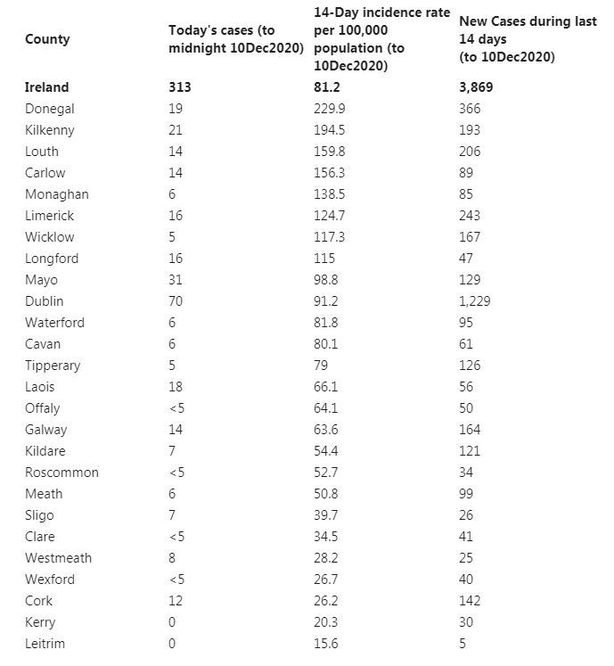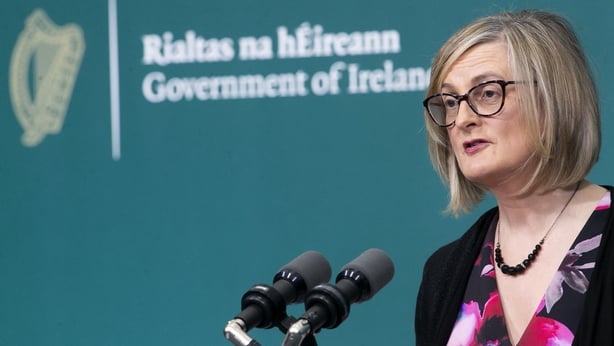There have been three further deaths related to Covid-19, the Department of Health has said.
It also said it was notified of 313 new cases of the coronavirus.
There have now been 75,507 confirmed cases of Covid-19 in Ireland, and 2,120 coronavirus-related deaths.
As of 2pm, the number of patients in ICU was down one from yesterday to 35.
Of the 313 cases notified today, 67% were below 45 years of age and the median age was 35.
The department said 144 cases were men, while 169 were women.
It said 70 of the cases were in Dublin, 31 were in Mayo, 21 were in Kilkenny, 19 were in Donegal, 18 were in Laois and the remaining 154 cases are spread across 19 other counties.
The 14-day incidence rate per 100,000 population was at 81.2.
Donegal has the highest 14-incidence rate per 100,000 population at 229.3, followed by Kilkenny at 194.5 and Louth at 159.8.
There were no new cases notified in Kerry and Leitrim.

Earlier, the Government advised people to start restricting their movements now if they plan to spend Christmas with vulnerable family members.
The Assistant Secretary-General at the Department of the Taoiseach said that with just two weeks to go, people should start to limit their contacts now.
At a briefing this morning, Liz Canavan said: "It won't be sufficient to start reducing your contacts in the couple of days before Christmas.
"That means you might have to postpone that meal with friends until after Christmas, and it will mean avoiding crowds."
Ms Canavan said that everyone should now be thinking about planning their holidays because it has implications for how we spend the next two weeks in the run-up to Christmas.
She said: "We are trying to get to 2021 safely, we want to avoid another spike."
Ms Cavanan added that just because a vaccine is on the way, it does not give us immunity over the Christmas season.
Read more: Latest coronavirus stories
Ms Canavan said the aim is to try to keep the virus numbers at the same level as they have been in recent weeks, or lower and that to do this, people must limit the number of people they spend time with to a "very small circle".
She said that Covid-19 has spiked in countries like Canada and the US following Thanksgiving celebrations.

Ms Canavan said: "We don't want to do that here. Let's learn the lessons from other countries and be determined not to repeat what happened there."
She said that just because certain things are now permitted due to the easing of restrictions, it "doesn't mean you have to do them".
Ms Canavan also urged people who go out shopping or socialising to "remember the basics".
This means wearing a mask in crowded places, even outdoors on busy shopping streets or in queues, as well as keeping your distance and staying at home if you feel unwell.
If people are planning to meet friends this weekend, Ms Canavan said people should do this outdoors if possible, but if it is indoors, to make sure the space is well ventilated and avoid hugs and handshakes.
Dublin city centre was 80% busier last Saturday night than the previous week since Covid-19 restrictions were eased.
Ms Canavan said: "Always try to avoid crowds, think about planning that meal on a weeknight, for example.
"We know from data in Dublin, that the city centre had its busiest weekend since March last weekend. 2-3pm was the busiest time, and 9-10am was the quietest.
"Traffic volumes around some of the big Dublin shopping centres last weekend saw a 40% increase."
Yesterday, Chief Medical Officer Dr Tony Holohan also advised people to consider restricting their movements now to "to ensure the safest possible interaction with your family over Christmas".
Dr Holohan said: "Risk assess the environments you plan to be in over the next two weeks; are they compliant with public health measures? Can you keep a two-metre distance? Are people wearing face coverings?
"Now is the time to make decisions about what interactions are necessary and pose the lowest risk to you, your family and friends over Christmas."
Dr Holohan said minimising contacts over the next fortnight was vital.
He said the example of Thanksgiving-related infections in the US showed even short-term gatherings could result in a rise in the number of cases.

